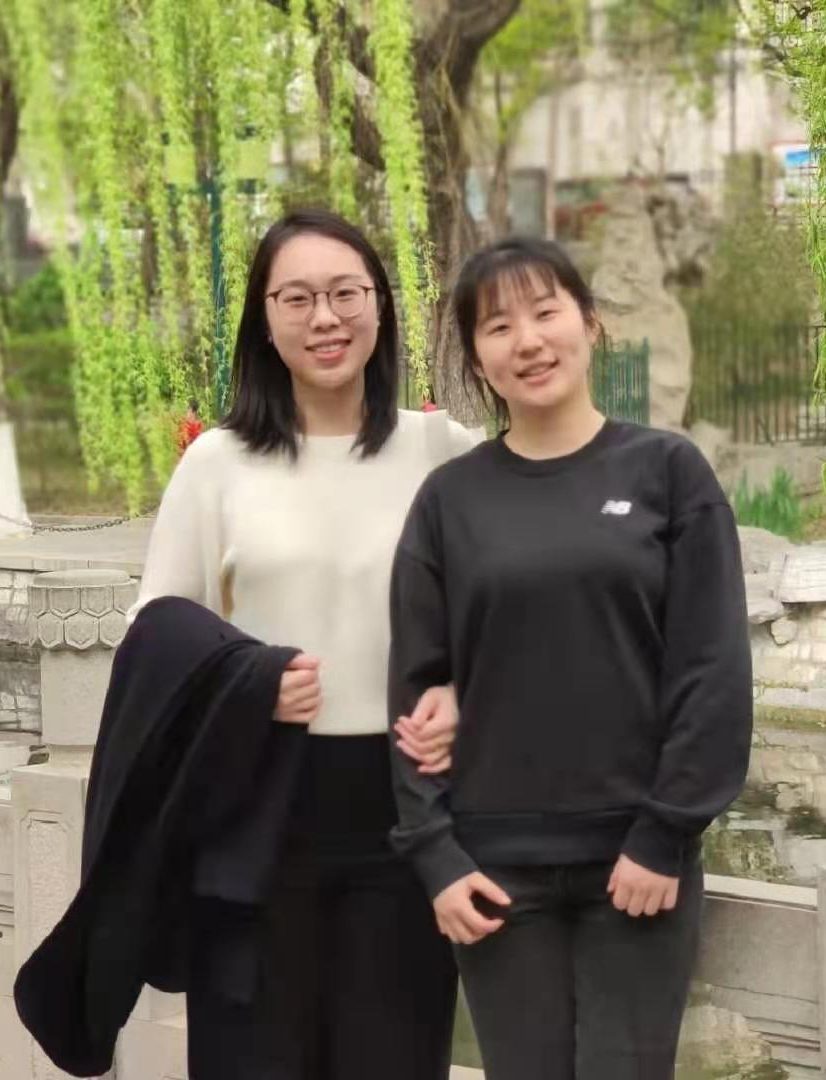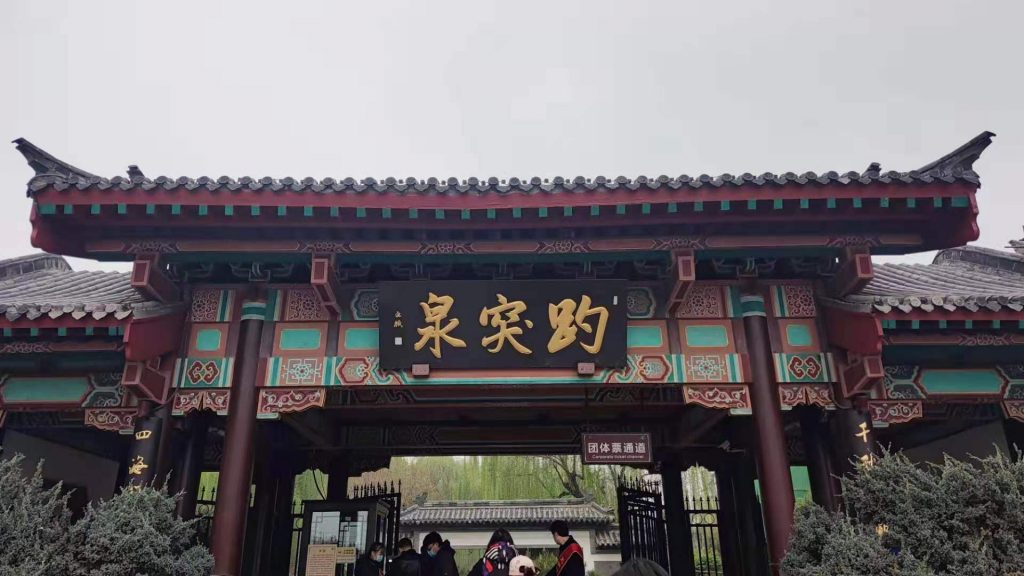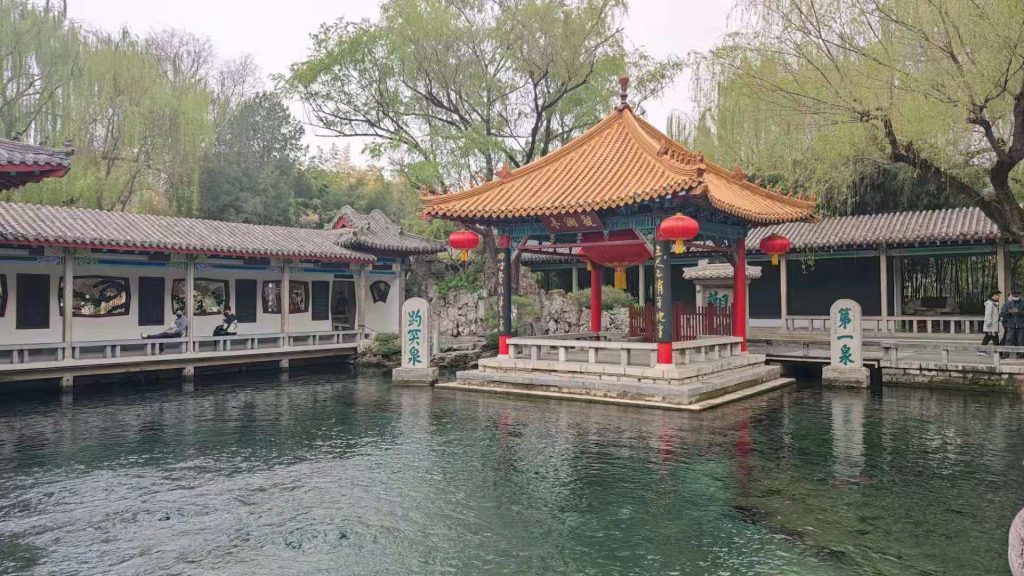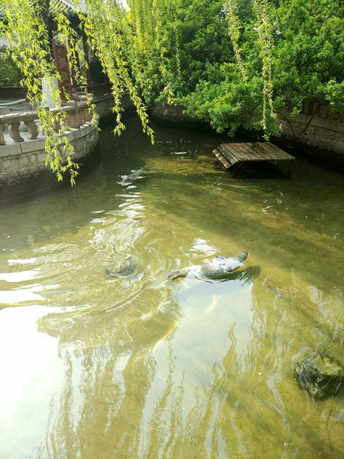
It’s not to do with the spring season, nor with trampolines, but the fluidity of the waters.
In late spring, our alumni and volunteers Xiaohui (小惠), left, and Zhenru (珍如), right, who have found jobs in different places of China, joyfully reunited in Ji’nan (济南 Jǐ’nán), the provincial capital of Shandong (山东 Shāndōng). While having enjoyed the beautiful scenes of the city which is famous for its artesian springs (泉水 quán shuǐ), they would like to share their findings with us.
Do you know which city has most springs in China? The answer is Ji’nan, which is known as the Spring City with 72 springs altogether. Among them, the most famous one is called Baotu Spring. During Qing Dynasty’s Emperor Qianlong’s southern tour, Baotu Spring was regarded as the “No. 1 Spring under the Heaven” because of the mellow and sweet taste of tea made from its water.
Zhenru and Xiaohui
About Baotu Spring
If you ever pay a visit to Ji’nan, you will find that Baotu Spring (趵突泉 Bàotū Quán) is located in the city centre. The spring pond is 30-meter long and 18-meter wide, accommodating three outlets with streams gushing out from the ground. There is large stone masonry around the Spring. We would definitely recommend you to lean on the railing for a better feel to observe the streams gushing in the pond from underground limestone caves.

The famous modern playwright Lao She (老舍, Lǎo Shě) once wrote that “the waters gush up from the spring’s eyes, and rise half a meter above the surface of the water, constantly rolling like boiling”. We were there eager to see this wonder – the “boiling” scene. However, we felt rather disappointed that we didn’t see any “constantly rolling” waters; only three streams were there rippling mildly. Maybe it was because the waters were exhausted after running for hundreds of years.

What was astonishing was that we found two baby seals in the pond, playing with each other, as seals normally are seen in the sea. It turned out that the waters are specially treated to be in line with sea water quality to accommodate the creatures, according to the local authority that manages the scenic sites, despite the disputes arising from some tourists and people who were concerned with animals right and protection.

One of the reasons to introduce two seals in the Spring is to do with the double puns in the mixture of Chinese and English contexts.
The name in Chinese of seals is 海豹 (hǎibào), literally meaning ‘sea (海 hǎi) leopard (豹 bào), the second syllable of which echoes with the pronunciation of “趵 (bào)” in Baotu Spring (趵突泉 Bàotū Quán). “突 (tū)” sounds similar to ‘two’ in English. So today people jokingly refer to Baotu Spring as the spring having two seals, though “趵突 (bàotū)” originally means jumping and rushing out and forwardly.
Image @Zhenru SHANG
So, what do you think of the idea of keeping seals in the waters? You may share your opinions in the box below and read more detailed report here.
Learn the words and phrases
- 济南 Jǐ’nán – Ji’nan, the provincial capital of Shandong; 济 Jǐ – the river of Ji; 南 nán – south
- 山东 Shāndōng – Shandong province; 山 shān – mountain, hill; 东 dōng – east
- 泉水 quán shuǐ – spring, the waters; 泉 quán – spring; 水 shuǐ – water
- 趵突泉 Bàotū Quán – Baotu Spring; 趵 bào – jump; 突 tū – out and forward
- 第一泉 dì yī quán – The No. 1 Spring; 第 一 dì yī – No. 1
- 海豹 hǎibào – seal; 海 hǎi – sea; 豹 bào – leopard
